Mike Seeger

Mike Seeger (June 6, 2009) at taping of Folkways TV show on the Music of Surry Co. photo: David Holt
Mike Seeger Memorial Celebration-Dec. 6, 2009
Mike Seeger (August 15, 1933 – August 7, 2009)
Eulogy by David Holt:
Mike Seeger was like a beacon in the night to me…and I am sure to many of you as well. In the 1960s there was no precedent for someone who was a tremendous musician and performer, a music collector, and an outstanding “lay” folklorist. Mike forged a new path and led the way for hundreds of others to follow his example. And he did it better than anyone has ever done it before and probably ever will.
I first heard Mike in 1967 while in college. A friend of mine who lived on a mattress in a laundry closet introduced me to the Ramblers. My friend, Steve, had few possessions: just a banjo, an old record player and two record albums: the Stanley Bros. “Sacred Songs from the Hills” and the New Lost City Ramblers “Songs from the Depression.”
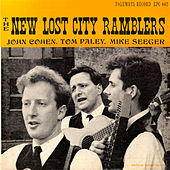 The approach of the Ramblers was a revelation. Here were guys playing music taken from the old 78 recordings and delivering it with all the gusto of the originals. It was as though a vast treasure had been lying dormant for 40 years and had been opened up to anyone who cared to pursue it. Mike and the Ramblers helped start what is now a world wide movement of old time music.
The approach of the Ramblers was a revelation. Here were guys playing music taken from the old 78 recordings and delivering it with all the gusto of the originals. It was as though a vast treasure had been lying dormant for 40 years and had been opened up to anyone who cared to pursue it. Mike and the Ramblers helped start what is now a world wide movement of old time music.
Back in the 60s it was frowned upon for folklorists to be players of traditional music, especially to be performers of the music for a livelihood. Mike blazed that trail for us. Showing us how to be passionate preservationists as well as performers….it was not just a profession but a way of life. He traveled hundreds of thousands of miles creating an audience for old time music. It is a romantic life, especially if you are not the one living it.
Mike was born into folk music aristocracy …where even the house
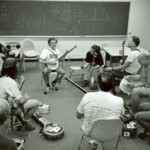
Mike Seeger teaching at Warren Wilson College
keeper, Libba Cotten, became a world famous musician.
The Seeger home was full of music with exciting people were always dropping in, Lead Belly, Woody Guthrie, John Jacob Niles, Bess Hawes, John and Alan Lomax and of course, Pete.
Mike’s father, Charles Seeger wrote in the liner notes to American Folk Songs: “The house resounded morning, noon and night to nearly 1000 discs of folk music. The children learned the music in their bassinettes and play pens long before any other music reached their ears. By the time they were in their teens Michael and Peggy were delighting gatherings with My Father Was a Drunkard, Careless Love and Roving Gambler. The children had a breadth of folk music experience.”
It would be enough musical pressure to make most kids become accountants or computer programmers. But Mike took this great gift of family heritage and ran with it. Always working on some new project
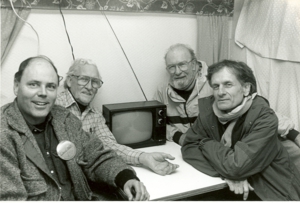
Lft to Rt: David Holt, Wade Mainer, Pete Seeger, Mike Seeger
He was our model for how to collect and preserve the music, how to present old timers to new audiences, how to step back and put the focus on the old masters and help them reach out to city folks, how to play traditional music and bend it to fit you as an individual but not break the tradition, how to treat everyone honestly and with great respect.
Here is a list of just a few of the people he collected….and this is just scratching surface
• Ashley, Clarence, 1895-1967.
• Baker, Kenny, 1926-
• Balfa Brothers.
• Ball, E. C. (Estil Cortez), 1913-1978.
• Bogan, Ted, 1913-
• Boggs, Dock, 1898-1971.
• Carter, Maybelle, 1909-1978.
• Clements, Vassar.
• Cotten, Elizabeth.
• Creed, Kyle.
• Hazel Dickens
• Emmy, Cousin, 1903-1980.
• Flatt, Lester.
• Gerrard, Alice, 1934-
• Holcomb, Roscoe.
• Hopkins, Doc, b. 1899.
• Hurt, Mississippi John, 1894-1966.
• Jarrell, Tommy.
• Jones, Grandpa, 1913-1998.
• Ledford, Lily May, 1917-
• Lilly Brothers.
• Logan, Tex.
• Louvin Brothers.
• Mainer, Wade
• Martin, Carl, 1906-1979.
• Martin, Jimmy.
• McGee Brothers.
• Monroe Brothers.
• Reed, Ola Belle.
• Reno, Don.
• Riddle, Leslie.
• Robertson, Eck, 1887-1975.
• Scruggs, Earl.
• Snow, Kilby, 1905-1980.
• Stanley Brothers.
• Stoneman, Ernest V.
• Walker, Frank.
• Ward, Wade.
• Watson, Doc.
• Wiseman, Mac.
• Workman, Nimrod.
Recently I got very interested in learning the fingerpicking of Merle Travis. I looked at all the albums Travis made and you know the best one was recorded by Mike Seeger in Boston in 1959.
For those of us following in his footsteps, he held our feet to the fire and kept us honest. Mike was an eccentric, no doubt. He could be demanding and stubborn and sometimes down right persnickety. But it was easy to overlook these things because you knew at the heart of things he had unshakable integrity and cared deeply for the music and the musicians.
Mike was a real hero to me. I feel lucky to have him lived in this world
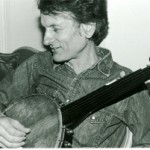
Mike Seeger Photo: D.Holt
at the same time as Mike and be able to call him a friend.
As long as humans care about American folk music, people will be delving into Mike’s collections and his music. It is a legacy that will endure far into the future.
Mike loved this old music and within this arcane music he championed an instrument that was more obscure than all the rest: the Jew’s harp.
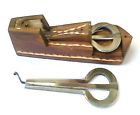 We went to two International Jew’s harp festivals together, one in Molln, Austria, one in Rouland, Norway. We came across a hand crafted pair of harps made in Sakha Yakutks from the finest motorcycle parts. It was a rare thing to find two tuned right together. Mike bought one, I bought the other. We thought we could play a duet with them sometime.
We went to two International Jew’s harp festivals together, one in Molln, Austria, one in Rouland, Norway. We came across a hand crafted pair of harps made in Sakha Yakutks from the finest motorcycle parts. It was a rare thing to find two tuned right together. Mike bought one, I bought the other. We thought we could play a duet with them sometime.
You see, the people of Sakha Yakutks don’t play tunes on the Jew’s harp. They play what they call “Atmospheres” which means they play their feelings or improvise the beauty of a sunset.
Let me play that for you now.
We love you, Mike.
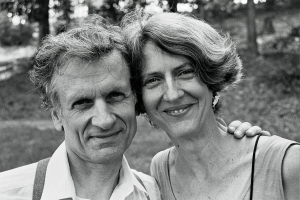
Mike and Alexia Photo: D.Holt
